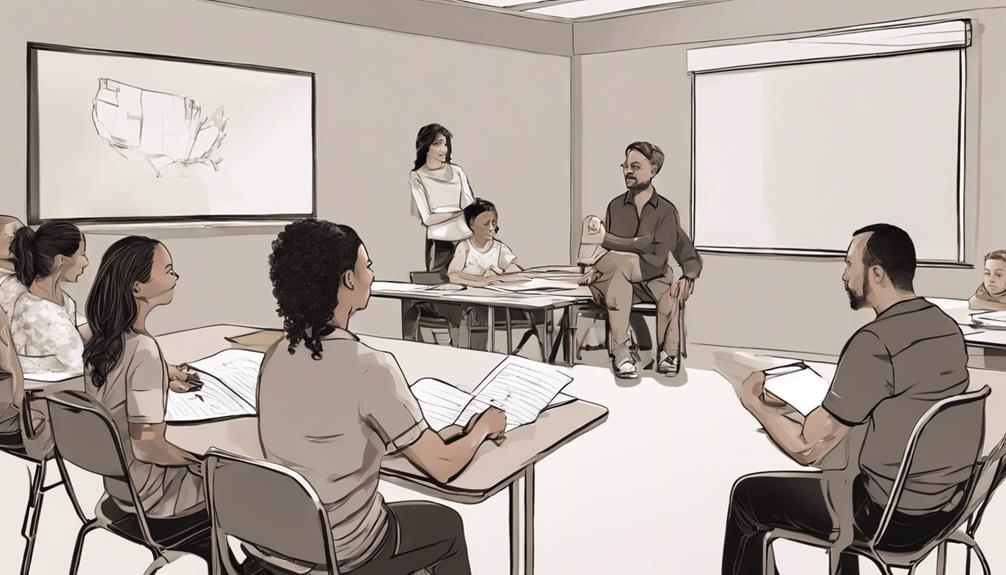Interested in learning how to navigate the divorce process in Nevada smoothly? Understanding residency requirements and completing the settlement are crucial components. Follow these seven key steps to ensure a seamless dissolution.
Each step plays a significant role in ensuring that both parties can move forward with clarity and fairness. Let's explore these steps together to unveil the essential aspects that shape the divorce process in Nevada.
Key Takeaways
- Meet residency requirements and file necessary paperwork accurately.
- Complete mandatory parenting education for custody considerations.
- Provide full financial disclosure for fair asset division.
- Reach mutual agreements on spousal support and final settlement terms.
Residency Requirements
When considering getting a divorce in Nevada, one crucial aspect to be aware of is the residency requirements mandated by the state. Nevada law stipulates that at least one spouse must reside in the state for a minimum of 6 weeks before filing for divorce. This requirement applies to both traditional marriages and domestic partnerships. It's important to note that proof of residency may be requested by the court during the divorce proceedings to ensure compliance with this rule.
Understanding and meeting the residency criteria is vital as it directly impacts the jurisdiction of the court where the divorce case will be heard. The appropriate court for filing the divorce petition is determined by factors such as the location of the cause of action, the spouse's residence, or the place of last cohabitation. Ensuring you fulfill the residency requirements is essential to establish jurisdiction for your divorce case in Nevada. Failure to meet these requirements could lead to delays or complications in the legal process.
Legal Grounds for Divorce

One of the key aspects to consider when seeking a divorce in Nevada are the legal grounds for dissolution of marriage. Here are some important points regarding the legal grounds for divorce in Nevada:
- Incompatibility: Couples can seek a divorce in Nevada based on incompatibility without the need to prove fault or wrongdoing.
- Living Separately: Living separately for at least one year is another legal ground for divorce in Nevada.
- Legally Insane: If one spouse has been legally insane for a period of two years, this can also be grounds for divorce in Nevada.
- No-Fault State: Nevada operates as a no-fault divorce state, meaning fault-based grounds have been eliminated, and divorces are primarily based on irreconcilable differences or the breakdown of the marriage relationship.
In Nevada, the focus is on the irretrievable breakdown of the marital relationship rather than assigning blame to either party. Understanding these legal grounds is crucial when navigating the process of divorce in Nevada.
Filing Initial Paperwork
To properly initiate the divorce process in Nevada, we must accurately complete and file the necessary forms for the dissolution of marriage. These forms include the Cover Sheet, Summons, and Complaint for Divorce. It's crucial to fill out all sections correctly to avoid any delays or complications during the court review.
Nevada offers multiple language options for the forms to cater to diverse needs and preferences, ensuring accessibility for all. Once the forms are completed, they should be filed at the district court in Nevada to officially kickstart the divorce proceedings.
When filing the initial paperwork, it's essential to be aware of the varying filing fees by county in Nevada. Understanding these fees and exploring potential fee waiver options can help manage the costs associated with filing for divorce.
Serving Divorce Papers

Properly serving divorce papers plays a crucial role in advancing the legal proceedings towards resolution. When serving divorce papers to your spouse, it's important to follow specific guidelines to ensure compliance with court requirements. Here are some key points to consider:
- Methods of Service: You can serve divorce papers through personal delivery, certified mail, or by hiring process servers. Each method has its own requirements and implications.
- Official Notification: Serving divorce papers ensures that your spouse is officially notified of the legal action against them. This step is essential for transparency and fairness in the legal process.
- Complying with Court Requirements: Failure to serve divorce papers correctly can lead to delays or even dismissal of your case. It's crucial to adhere to the court's instructions to avoid setbacks.
- Importance of Process Servers: Process servers are professionals who specialize in serving legal documents. Their expertise can help ensure that the service is done correctly and in accordance with the law.
Financial Disclosures
Ensuring full transparency and fairness in the divorce process, both parties involved in a Nevada divorce case must provide complete and accurate financial disclosures detailing income, assets, expenses, and debts. It's imperative to comply with the requirement of full and accurate information to avoid legal consequences.
Failure to provide honest financial disclosures can lead to penalties and hinder the smooth resolution of the divorce proceedings. Complete reporting of assets and liabilities is essential for the fair division of property, determination of alimony, child support, and other financial aspects.
Financial disclosures play a pivotal role in facilitating a just outcome by providing the necessary information for the court to make informed decisions. Therefore, both parties should ensure that they disclose all relevant financial details to enable a transparent and equitable resolution of the divorce proceedings in Nevada.
Parenting Education Course

Completing a parenting education course is required for divorcing parents in Nevada with minor children.
We understand the importance of this course in helping parents navigate the challenges of co-parenting post-divorce.
Remember to submit your completion certificate to the court as part of the divorce process.
Mandatory Course Requirement
To proceed with a divorce in Nevada involving minor children, completing the mandatory Parenting Education Course is a crucial step that must be fulfilled before finalizing the process. This course is designed to help divorcing parents navigate the complexities of co-parenting, understand child development, and enhance communication skills. Here are some key points regarding the mandatory course requirement:
- Mandatory Completion: The Parenting Education Course is a mandatory requirement for divorcing parents with minor children in Nevada.
- Topics Covered: The course covers essential topics such as co-parenting strategies, child development stages, and effective communication skills.
- Proof of Completion: Parents must provide proof of completing the course to the court as part of the divorce proceedings.
- Importance: Failure to complete the course may lead to delays or impact the finalization of the divorce.
Online Options Available
After completing the mandatory Parenting Education Course for divorcing parents with minor children in Nevada, exploring online options for fulfilling this requirement can offer added convenience and flexibility. Online courses often cover essential topics such as co-parenting strategies, child development stages, and effective communication skills, preparing parents for post-divorce co-parenting challenges. These courses typically provide completion certificates that can be easily filed with the court as part of the divorce process. It's important to note that while online options are convenient, different counties in Nevada may have specific requirements or variations in the parenting education course. Ensuring compliance with both state and county regulations is crucial for a smooth divorce process.
| Online Parenting Education Courses | Benefits | Considerations |
|---|---|---|
| Flexibility in scheduling | Convenient for busy parents | Verify acceptance by court |
| Accessible from anywhere | Self-paced learning | Check for interactive components |
| Ability to review material | Cost-effective option | Ensure course covers required topics |
Completion Certificate Submission
Filing the completion certificate from a parenting education course is a mandatory step for divorcing parents in Nevada. When dealing with this aspect of the divorce process, keep the following points in mind:
- Ensure you have completed the mandatory parenting education course.
- File the completion certificate with the court as required.
- Understand that the course focuses on educating parents about effective co-parenting post-divorce.
- Be aware that failure to meet filing requirements or submit the completion certificate promptly can potentially delay the finalization of your divorce.
Navigating the specific requirements and ensuring proper court submission of the completion certificate is crucial for a smooth divorce process in Nevada.
Final Settlement

When it comes to finalizing a divorce in Nevada, the final settlement plays a vital role. This phase involves reaching agreements on crucial aspects such as property division, custody arrangements, and spousal support.
Ensuring that both parties are in sync with these terms is key to formalizing the end of the marriage.
Property Division Process
During the property division process for a divorce in Nevada, spouses must equitably divide assets and debts accumulated throughout their marriage according to the state's community property laws.
When finalizing the settlement, the following key points are considered:
- Community Property Laws: Nevada follows these laws, meaning assets and debts are typically divided equally.
- Assets and Debts: The final settlement may include real estate, vehicles, bank accounts, retirement accounts, and personal property.
- Factors Considered: Length of the marriage, each spouse's contribution, and future financial needs are taken into account.
- Fair and Equitable Division: Ensuring a fair and equitable property division process is crucial for reaching the final settlement in a Nevada divorce.
Custody and Visitation
Navigating the final settlement for custody and visitation in Nevada post-divorce is a crucial step in determining parental rights and responsibilities moving forward. When it comes to child custody and visitation agreements, Nevada courts prioritize the best interests of the child. Factors such as parental involvement, the child's preferences, and stability are carefully considered in crafting custody arrangements.
It's essential to resolve custody and visitation issues amicably to minimize conflict and promote effective co-parenting post-divorce. By focusing on the well-being of the child and working together to find suitable custody arrangements, parents can ensure a smoother transition into post-divorce co-parenting.
Prioritizing the child's needs and fostering a cooperative co-parenting relationship are key aspects of finalizing custody and visitation agreements.
Spousal Support Agreements
Crafting spousal support agreements post-divorce in Nevada involves considering various factors such as earning capacity and marriage length to determine the financial support needed. When finalizing spousal support agreements, it's crucial to keep in mind the standard of living established during the marriage and the financial contributions made by each spouse.
Whether the spousal support is temporary or permanent depends on the specific circumstances of the marriage and the financial needs of both parties. These agreements can be negotiated between the spouses or decided by the court if an agreement can't be reached.
It's important to navigate the complexities of tax implications and legal requirements when establishing spousal support agreements in Nevada.
Frequently Asked Questions
What Are the Steps for Divorce in Nevada?
Getting a divorce in Nevada involves meeting residency requirements, filling out forms like the Joint Petition for Divorce, serving papers correctly, and finalizing with the Decree of Divorce. Grounds like incompatibility or separation are crucial to understand.
How Long Do You Have to Be Separated Before Divorce in Nevada?
Separated for at least a year before divorce in Nevada. Living separately, maintaining distinct residences, no cohabitation. Proof may be needed. Resetting the timeline if living together. Remember, the separation period is crucial.
How Much Does It Cost to Get a Divorce in Nevada?
Getting a divorce in Nevada can cost between $250 to $300 in filing fees. Additional charges for services like document serving or mediation can apply. It's crucial to understand these costs and plan accordingly for a smooth process.
What Is a Wife Entitled to in a Divorce in Nevada?
In a divorce in Nevada, a wife is entitled to an equal division of marital property, potential spousal support based on various factors, fair child custody arrangements, a share of financial assets acquired during marriage, and legal representation for protection.
Conclusion
As we navigate through the process of divorce in Nevada, each step brings us closer to untangling the complexities of our relationship. Like a delicate dance, we must carefully follow the steps outlined to reach a final resolution.
Remember, just as a puzzle comes together piece by piece, so too will our journey towards a new chapter in life. Stay strong, stay informed, and trust that the path forward will lead to a brighter tomorrow.









